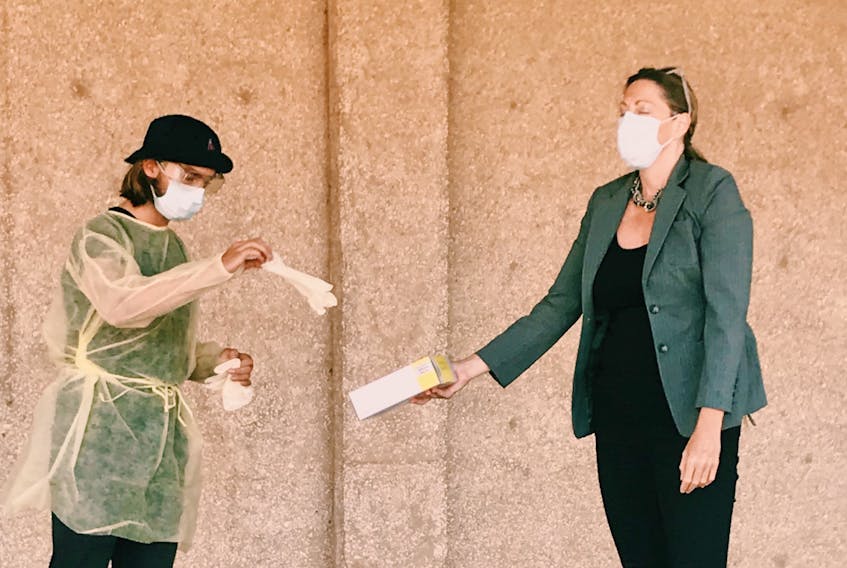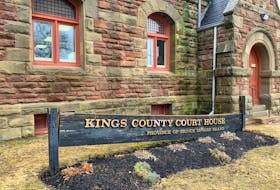WOLFVILLE, N.S. — Acadia University’s president and vice-chancellor Dr. Peter Ricketts says they are “fully supportive” of the provincial government’s newly announced measures for student COVID-19 testing.
The Government of Nova Scotia announced new measures under the Public Health Act on Aug. 20. These require post-secondary students coming to Nova Scotia from outside Atlantic Canada to complete the Nova Scotia Safe Check-in, which is a mandatory online self-declaration travel form; self-isolate for 14 days and have three COVID-19 tests.
Premier Stephen McNeil announced the new measures following consultations with the Office of the Chief Medical Officer of Health. Students from within Atlantic Canada must self-isolate only if they’ve travelled outside the Atlantic provinces in the past 14 days.
Ricketts said they have been working closely with the provincial government for many months and “we applaud the province’s approach to testing and are fully supportive.”
“Asymptomatic testing of students from outside the Atlantic Bubble will help ensure our students are healthy and that our student body will not contribute to any potential community spread of COVID-19 upon their arrival,” Ricketts said.
Learning about testing
Asymptomatic testing of Acadia students will include a COVID-19 testing evaluation survey, an initiative being led by researcher Dr. Lisa Barrett.
Acadia Students’ Union president Brendan MacNeil recently had the experience of conducting a COVID-19 test on Barrett. During a tour of the campus, Barrett was explaining what could be expected with regard to student testing.
MacNeil said she took out a bag containing all the required testing materials in order to do a demonstration. MacNeil thought at first that he was going to be the test subject but he was given hand sanitizer and outfitted in safety equipment - including a gown, goggles, mask and gloves - and conducted a nasal swab on Barrett.
“I was a little uneasy at first but she coached me through it and it’s really not that big of a deal,” MacNeil said. “You’ve just got to have a steady hand and don’t go too far.”
“Our biggest fear was compliance ... We wanted to give these students enough space and responsibility
that they aren’t forced to break the rules and break self-isolation and go outside.”
He said the nasal swab is marked so that the person conducting the test knows how far it can safely be inserted into the nasal cavity.
“Really, it’s as simple as that, you get geared up and then you take your nasal swab and in it goes for a few seconds. You wiggle it around and then pop it into a little capsule and label it and you’re done,” MacNeil said.
He said it is somewhat uncomfortable for the person being tested but MacNeil wants to assure students that there is nothing to fear and it’s by no means dangerous when done correctly.
Fresh air and exercise

Students in self-isolation will be given opportunities for restricted outdoor exercise near their campus residence or in their yard if living off-campus. Movement in the community will be limited to travelling to and from COVID-19 testing centres. Information on student movements will be shared with the campus community to help prevent incidental contact.
MacNeil said the ASU advocated for this on all fronts on behalf of the student body, both during the university’s planning process and once the ASU was informed that the university would be following the new provincial public health protocols.
He said they were emphasizing the importance of outdoor time to keep the brain active and to keep mental and physical health in check during students’ 14-day self-isolation. MacNeil said he is very pleased that the province made this concession.
“Our biggest fear was compliance, too,” MacNeil said. “We wanted to give these students enough space and responsibility that they aren’t forced to break the rules and break self-isolation and go outside.”
It’s anticipated that approximately 500 Acadia students will be subject to the mandatory measures, whether they reside on or off-campus. Public Health will send three COVID-19 testing appointments to affected students via email. These tests will be conducted over the two-week self-isolation period.
Did you know?
- All students, faculty, staff and visitors to Acadia’s campus are required to complete a daily online symptom check before attending class or reporting for work.
- Based on the results of the check-in, they will either be cleared to attend or directed to avoid campus and seek medical evaluation.
- Acadia’s occupational health nurse will monitor flagged responses and provide guidance and follow-up as necessary.
- COVID-19 testing for students or employees displaying any symptoms will be managed by the province’s 8-1-1 referral process.
- Each university and the Nova Scotia Community College has a re-opening plan on its website that has been approved by the chief medical officer of health and the Department of Labour and Advanced Education.
- Nova Scotia Health is setting up additional testing centres where needed to test students during self-isolation.
- The province is enhancing the border form for everyone arriving in Nova Scotia from outside the Atlantic provinces.
- The new Nova Scotia Safe Check-in allows better data collection and tracking and a digital check-in will soon replace follow-up phone calls to ensure people are self-isolating.
- The Nova Scotia Safe Check-in can be accessed at https://novascotia.ca/coronavirus/travel/.









